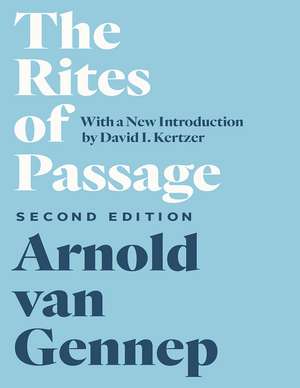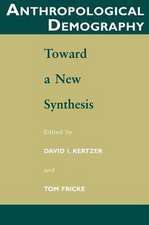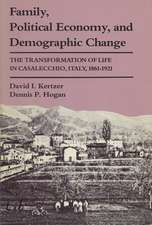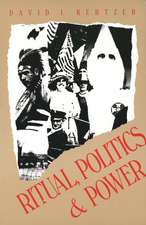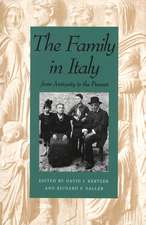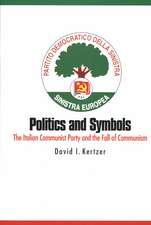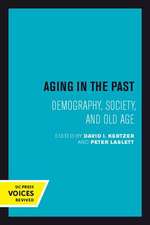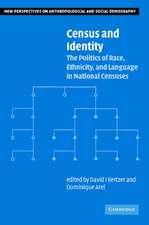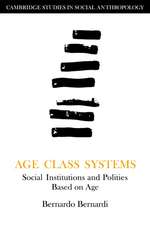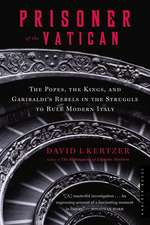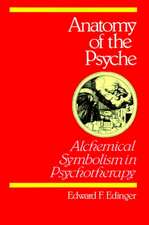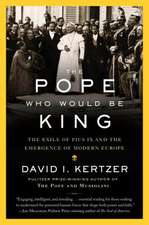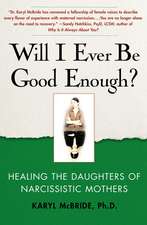The Rites of Passage, Second Edition
Autor Arnold van Gennep Introducere de David I. Kertzer Traducere de Monika B. Vizedom, Gabrielle L. Caffeeen Limba Engleză Paperback – 24 mai 2019
A CLASSIC WORK OF ANTHROPOLOGY—OVER SEVENTY THOUSAND COPIES SOLD
With a new introduction by Pulitzer Prize–winner David I. Kertzer
Arnold van Gennep’s masterwork, The Rites of Passage, has been a staple of anthropological education for more than a century. First published in French in 1909, and translated into English by the University of Chicago Press in 1960, this landmark book explores how the life of an individual in any society can be understood as a succession of transitions: birth, puberty, marriage, parenthood, old age, and, finally, death. Van Gennep’s great insight was discerning a common structure in each of these seemingly different transitions, involving rituals of separation, liminality, and incorporation. With compelling precision, he set out the terms that would both define twentieth-century ritual theory and become a part of our everyday lexicon.
This new edition of his work demonstrates how we can still make use of its enduring critical tools to understand our own social, religious, and political worlds, and even our personal and professional lives. In his new introduction, Pulitzer Prize–winning historian and anthropologist David I. Kertzer sheds new light on van Gennep, on the battles he fought, and on the huge impact the book has had since publication of the first English edition.
With a new introduction by Pulitzer Prize–winner David I. Kertzer
Arnold van Gennep’s masterwork, The Rites of Passage, has been a staple of anthropological education for more than a century. First published in French in 1909, and translated into English by the University of Chicago Press in 1960, this landmark book explores how the life of an individual in any society can be understood as a succession of transitions: birth, puberty, marriage, parenthood, old age, and, finally, death. Van Gennep’s great insight was discerning a common structure in each of these seemingly different transitions, involving rituals of separation, liminality, and incorporation. With compelling precision, he set out the terms that would both define twentieth-century ritual theory and become a part of our everyday lexicon.
This new edition of his work demonstrates how we can still make use of its enduring critical tools to understand our own social, religious, and political worlds, and even our personal and professional lives. In his new introduction, Pulitzer Prize–winning historian and anthropologist David I. Kertzer sheds new light on van Gennep, on the battles he fought, and on the huge impact the book has had since publication of the first English edition.
Preț: 183.54 lei
Nou
Puncte Express: 275
Preț estimativ în valută:
35.12€ • 36.29$ • 29.22£
35.12€ • 36.29$ • 29.22£
Carte disponibilă
Livrare economică 27 februarie-13 martie
Livrare express 12-18 februarie pentru 19.75 lei
Preluare comenzi: 021 569.72.76
Specificații
ISBN-13: 9780226629490
ISBN-10: 022662949X
Pagini: 256
Dimensiuni: 152 x 229 x 18 mm
Greutate: 0.25 kg
Ediția:Second Edition
Editura: University of Chicago Press
Colecția University of Chicago Press
ISBN-10: 022662949X
Pagini: 256
Dimensiuni: 152 x 229 x 18 mm
Greutate: 0.25 kg
Ediția:Second Edition
Editura: University of Chicago Press
Colecția University of Chicago Press
Notă biografică
Arnold van Gennep (1873–1957) was a prolific French scholar without a permanent academic position who lived by writing, translating, and public lecturing.
